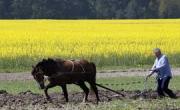Ukraine: Breadbasket Again?
Reaping Ukraine’s Agricultural Bounty Will Be Tough
Farming exports could offer some hope amid Ukraine’s troubles with Russia, but red tape and lack of foreign capital present obstacles. Avangardco's Oleg Bakhmatyuk believes deep foreign pockets are the answer.
Amid Ukraine’s sea of troubles — Russia’s annexation of its southern province of Crimea, violent disorder in several eastern cities and dire financial straits — one hopeful beacon glimmers on the horizon: the country’s agricultural revival in an increasingly hungry world. Blessed with vast black-earth plains, wet winters and hot, sunny summers, Ukraine was known as the breadbasket of Europe before the catastrophe of Soviet collectivization. The farm sector’s slow recovery has gathered momentum in recent years even as ousted president Viktor Yanukovych gravely mismanaged the rest of the economy. Agricultural exports jumped by 38 percent to $18.2 billion in 2012, according to official statistics. Last year’s figures almost certainly rose again as the country achieved a record grain harvest.
Ukraine’s farming renaissance aligns with a global megatrend of more human mouths to feed and less land whose productivity can be readily increased. Jeremy Grantham, whose Boston-based investment firm GMO manages $117 billion, recently pegged Ukraine and Brazil as the two countries best positioned to ramp up grain production as the Earth’s population swells to at least 8 billion from its current 7 billion. The European Bank for Reconstruction and Development is similarly bullish. “The EBRD looks at Ukraine strategically as an exporter not only of grain but of meat, dairy and value-added products,” says Anton Usov, chief of communications at the bank’s Kiev office.
Returning to breadbasket status won’t be easy, though. Buying and selling farmland remains illegal in Ukraine 22 years after the fall of communism. Local land barons, known by the Latin American term latifundistas, have worked ingeniously around this prohibition, stitching together long-term leases on thousands of adjacent peasant-owned smallholdings. Some dozen companies controlled by these tycoons are headquartered in Ukraine but trade on foreign exchanges. Warsaw Stock Exchange–listed KSG Agro, for instance, controls 92,000 hectares (227,000 acres), mostly in politically volatile Eastern Ukraine, where it grows sunflowers, rapeseed and wheat, among other crops. London-listed poultry producer Avangardco has leased enough chicken coops to house 23 million hens and sell powdered eggs as far afield as Indonesia and Angola. But the legal environment spooks foreign investors, and the public Ukrainian agribusinesses remain bit players on a global scale.
Large capital inputs are needed for those companies to move up the value-added chain to finished products and add storage for better leverage on export markets, says Vadim Bodaev, director of government affairs at Kiev-based private equity investor SigmaBleyzer. “The next stage of investment is in storage, infrastructure and logistics,” Bodaev explains. Ideally, Ukraine would attract $50 billion toward these goals over the next decade, he estimates. That number looks ambitious considering that the EBRD, the country’s largest foreign investor, committed all of $160 million to agricultural projects last year.
One potential deep foreign pocket is China, which is scouring the globe to lock in secure food sources. Beijing loaned the Ukrainian government $3 billion in 2012 to be repaid in corn, and last year it moved on to the private sector. In October, KSG Agro announced that it had signed a letter of intent with three Chinese state companies. Avangardco majority owner Oleg Bakhmatyuk, who also owns unlisted grain company UkrLandFarming, told the Financial Times in November that he anticipated “billion-dollar deals” with Chinese and other Asian investors. “Everyone in China has probably heard of me by now,” he bragged.
Usov of the EBRD listens to this buzz skeptically. “If you look at similar Chinese investment in countries like Kenya and Tanzania, they take forever to decide what to do,” he says. “I’ll believe it in Ukraine when I see it.”
The February Revolution, as Ukrainians call it, is a blow to the country’s agricultural sector in the short term, not least because Russia has been its largest export market. The interim government cobbled together after Yanukovych fled is treating farming as an afterthought. The new Agriculture minister, Ihor Shvaika, is a lawyer with little sector experience, chosen through interparty horse trading.
Ukraine’s torturous legal and bureaucratic environment for agribusiness has persisted through governments of all stripes. “One of the companies we invest in had 400 regulatory inspections last year,” Usov says. “That’s more than one a day.” Yet if the sector could grow under such adverse conditions, a little better weather on the governance side could spur a bountiful harvest.


